Tragedy at Virginia Tech
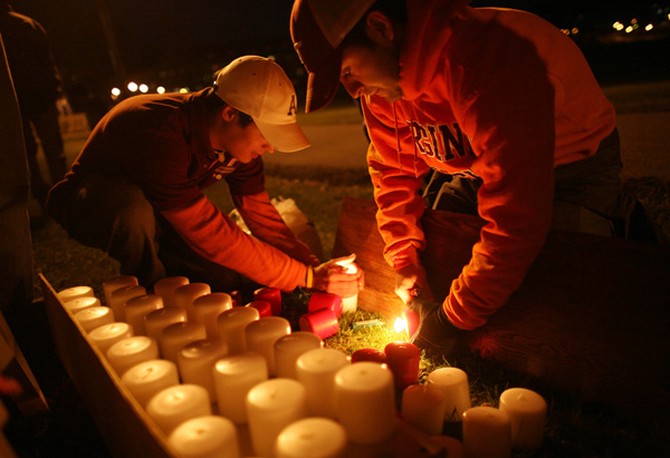
Photo: AP
On April 16, 2007, the deadliest shooting in U.S. history took place on the campus of Virginia Tech University. The gunman, 23-year-old English major Cho Seung-Hui, killed 32 people before taking his own life and injured at least 15 others. The tragedy has stunned the nation, shattered families and left students and faculty in a state of shock.
The night after the shooting, the world watched as tens of thousands of students and community members gathered in Blacksburg, Virginia, for a candlelight vigil to remember the victims of this senseless act of violence.
The night after the shooting, the world watched as tens of thousands of students and community members gathered in Blacksburg, Virginia, for a candlelight vigil to remember the victims of this senseless act of violence.
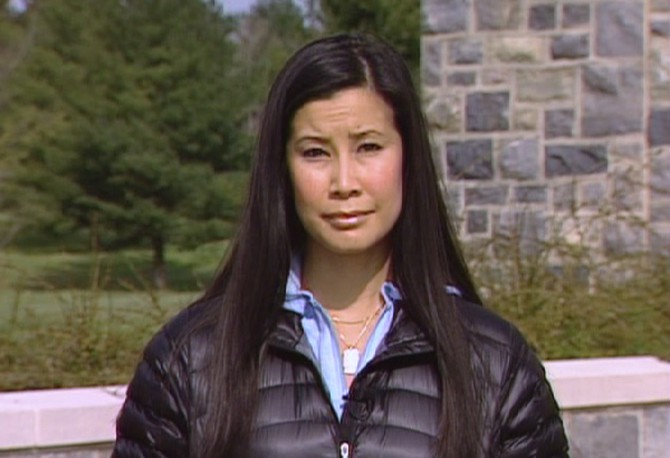
Oprah Show correspondent Lisa Ling is on campus, where she says many students are on their way home to be with their families. "Understandably, they need a break from this and many won't return until classes resume," Lisa says.
Lisa says being on campus has been a surreal experience. "[There are] a lot of days filled with sorrow and confusion, but really also a lot of pride and support," she says.
Initially when Lisa heard the gunman was a resident alien from Korea, she says "her heart sunk" because she was concerned about retaliation against anyone who looked Asian. "I talked to a number of Korean students here on campus and they were just absolutely devastated and many of their families were calling from as far away as Korea to tell them to leave campus immediately because they, too, were concerned about any kind of backlash."
Fortunately, Lisa says there seems to be an environment of love, not backlash. "The students here have been tremendously supportive of everything that's happened and all the students here as well," she says.
Lisa says being on campus has been a surreal experience. "[There are] a lot of days filled with sorrow and confusion, but really also a lot of pride and support," she says.
Initially when Lisa heard the gunman was a resident alien from Korea, she says "her heart sunk" because she was concerned about retaliation against anyone who looked Asian. "I talked to a number of Korean students here on campus and they were just absolutely devastated and many of their families were calling from as far away as Korea to tell them to leave campus immediately because they, too, were concerned about any kind of backlash."
Fortunately, Lisa says there seems to be an environment of love, not backlash. "The students here have been tremendously supportive of everything that's happened and all the students here as well," she says.
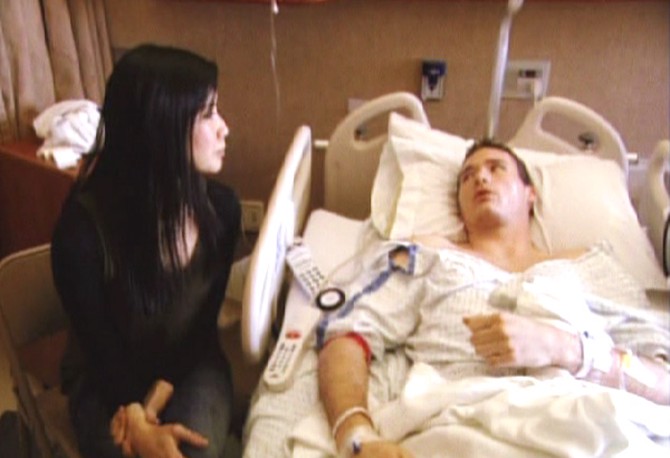
One day after the shooting, Lisa was granted exclusive access inside Carilion New River Valley Medical Center, where four injured students were taken. She meets Colin Goddard, a junior who was in French class when the gunman entered and started shooting.
It was about 9:30 a.m. when Colin says his class heard loud banging outside the door. "It got louder and it got closer, and it was very, very rapid in succession," Colin says. "So [the teacher] poked her head out. Immediately she pulled it back in with a terrified look on her face, told us all to get on the ground, call 911."
Colin immediately called 911 on his cell phone and told authorities where they were. Then, he says, bullets started coming through the wooden door and Cho Seung-Hui kicked it in. "Then I just looked on the ground and acted like I was dead," he says.
Colin says he never saw the gunman's face, nor did he ever hear him speak. "I saw his boots, I saw his pants, I saw his shirt, and I saw two holsters over each of his shoulders, pistol holsters, and then that's as much of him as I wanted to see. I didn't want to make eye contact," he says. "I thought if I looked at him, then he would know I'm here, I'm alive, I've seen you, and I think I would be in a lot worse position than if I had done that."
Colin says he remained silent as the gunman walked through the rows of desks, shooting people at random. He came to Colin's side of the room and shot two people before Colin says he was shot in the knee.
It was about 9:30 a.m. when Colin says his class heard loud banging outside the door. "It got louder and it got closer, and it was very, very rapid in succession," Colin says. "So [the teacher] poked her head out. Immediately she pulled it back in with a terrified look on her face, told us all to get on the ground, call 911."
Colin immediately called 911 on his cell phone and told authorities where they were. Then, he says, bullets started coming through the wooden door and Cho Seung-Hui kicked it in. "Then I just looked on the ground and acted like I was dead," he says.
Colin says he never saw the gunman's face, nor did he ever hear him speak. "I saw his boots, I saw his pants, I saw his shirt, and I saw two holsters over each of his shoulders, pistol holsters, and then that's as much of him as I wanted to see. I didn't want to make eye contact," he says. "I thought if I looked at him, then he would know I'm here, I'm alive, I've seen you, and I think I would be in a lot worse position than if I had done that."
Colin says he remained silent as the gunman walked through the rows of desks, shooting people at random. He came to Colin's side of the room and shot two people before Colin says he was shot in the knee.
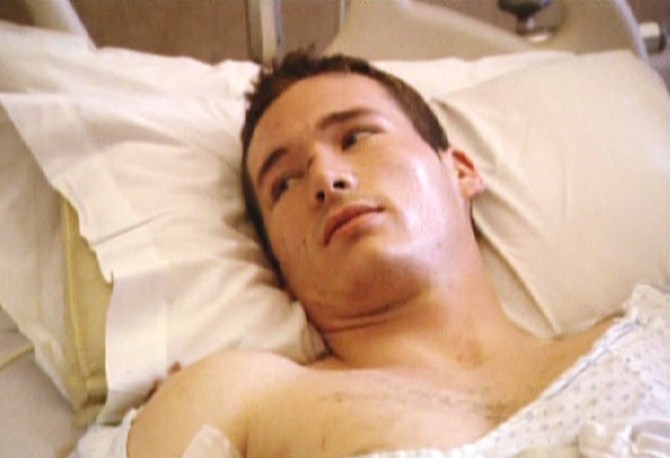
Colin says Cho left only to return 10 minutes later and walk down different rows shooting people. Again, Colin says, the gunman came to his row and shot him in the shoulder and the hip. "I squealed and I squirmed, you know, when I got hit, but that was one of the last bullets I heard. I heard one or two more shots towards the front of the room and then it was quiet," Colin says. "The next thing you know, the police were kicking the door trying to get in. As soon as they opened the door, they said, 'Shooter down! Shooter down!' So apparently ... one of the last bullets was for himself in the front of the classroom."
At first, Colin says it didn't hurt when he was shot because he was in so much shock. Did he ever think he was going to die? "I've taken three bullets and I'm still here," Colin says. "So I plan on keep going."
Colin is scheduled to have a rod implanted in his leg. "Good luck, buddy," Lisa says.
At first, Colin says it didn't hurt when he was shot because he was in so much shock. Did he ever think he was going to die? "I've taken three bullets and I'm still here," Colin says. "So I plan on keep going."
Colin is scheduled to have a rod implanted in his leg. "Good luck, buddy," Lisa says.
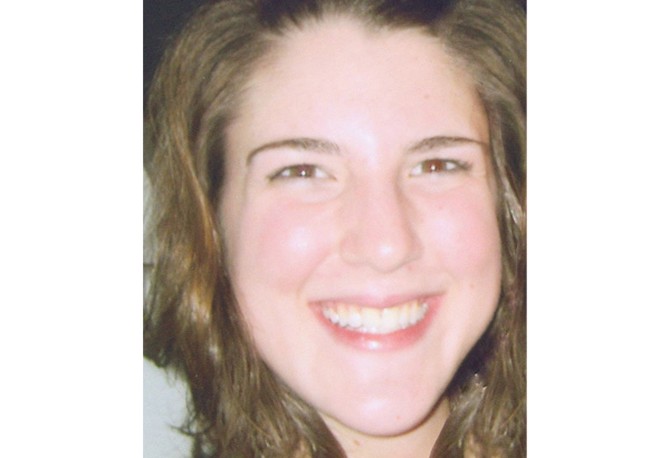
Caitlin Hammaren, who was 19, was killed in the same classroom where Colin Goddard was shot three times. Caitlin was a sophomore majoring in international studies and French. She was also a resident adviser in the dorms.
Her friends and roommates, Rochelle, Kelsey and Jessica, remember Caitlin as an amazing friend. "She said that I was her best friend. I think everybody that she talked to was her best friend. Everybody thinks that they were her best friend because that's how she made everybody feel," Rochelle says.
Kelsey says she last saw Caitlin at 9 a.m. on her way to class and that they didn't hear about Caitlin's death until about 11 p.m. that night. Waiting for her response was "horrifying," Rochelle says. "I texted her yesterday morning at 9:30 because I knew that she had left the dorm. I heard her leave," Rochelle says. "And then when I didn't hear back from her around 10:15, I texted her mom, and then her mom called me and said that they were headed down because they hadn't heard from her and that's not like her."
If they could say one last thing to Caitlin, what would it be? "We love her," Kelsey says. "When I saw her yesterday, now all I want to do is be able to go back and just tell her, 'Don't go to class,' after knowing what I know now. That's not going to happen."
Her friends and roommates, Rochelle, Kelsey and Jessica, remember Caitlin as an amazing friend. "She said that I was her best friend. I think everybody that she talked to was her best friend. Everybody thinks that they were her best friend because that's how she made everybody feel," Rochelle says.
Kelsey says she last saw Caitlin at 9 a.m. on her way to class and that they didn't hear about Caitlin's death until about 11 p.m. that night. Waiting for her response was "horrifying," Rochelle says. "I texted her yesterday morning at 9:30 because I knew that she had left the dorm. I heard her leave," Rochelle says. "And then when I didn't hear back from her around 10:15, I texted her mom, and then her mom called me and said that they were headed down because they hadn't heard from her and that's not like her."
If they could say one last thing to Caitlin, what would it be? "We love her," Kelsey says. "When I saw her yesterday, now all I want to do is be able to go back and just tell her, 'Don't go to class,' after knowing what I know now. That's not going to happen."
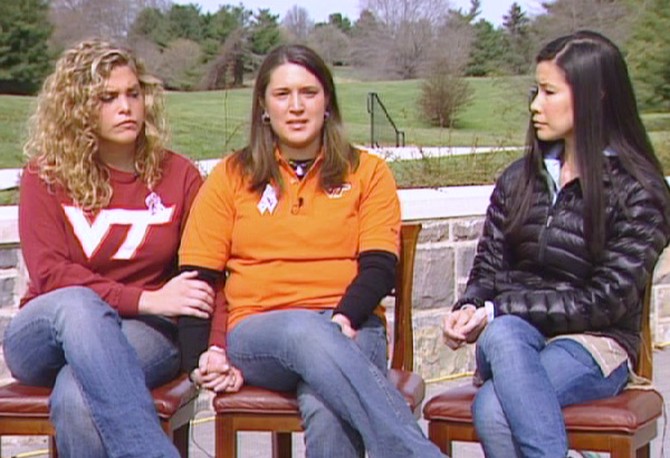
Kelsey says that Caitlin's death has put things in perspective for her and her friends. "You have to live life every day like it was your last, and you know, most people don't do that because the chances of something like this happening are rare," she says. "But it's safe to say that Caitlin did that. She was 100 percent positive every single day. Up and ready to go and just happy all the time."
After such a terrible tragedy, do the girls still feel like they want to stay on campus? "Of course," Kelsey says. "Hokie pride is the best thing going right now. And Virginia Tech has done an amazing job with everything and they've handled the situation to their best ability, and I don't think it could have happened any better."
Rochelle agrees. "Nobody could have done anything. If it didn't happen on Monday, it would have happened another day. Cutting classes that afternoon, it might have delayed him but I don't think that it would have changed anything, and blaming somebody isn't going to help it," Rochelle says. "It's what happened and we're going to get through it together. We're Hokies. Everybody's Hokies."
After such a terrible tragedy, do the girls still feel like they want to stay on campus? "Of course," Kelsey says. "Hokie pride is the best thing going right now. And Virginia Tech has done an amazing job with everything and they've handled the situation to their best ability, and I don't think it could have happened any better."
Rochelle agrees. "Nobody could have done anything. If it didn't happen on Monday, it would have happened another day. Cutting classes that afternoon, it might have delayed him but I don't think that it would have changed anything, and blaming somebody isn't going to help it," Rochelle says. "It's what happened and we're going to get through it together. We're Hokies. Everybody's Hokies."
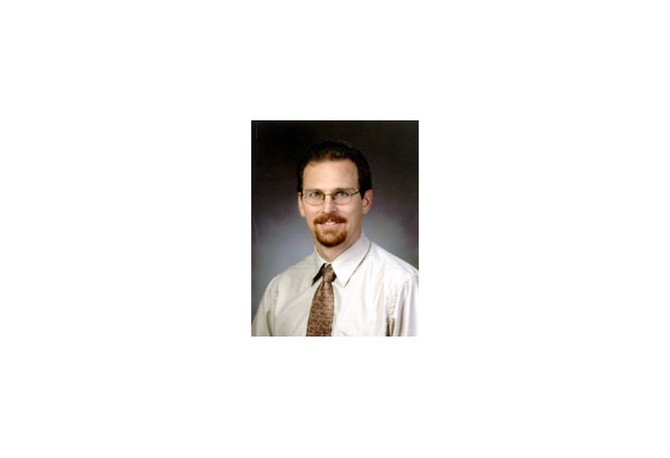
Kevin Granata, a professor of engineering science and mechanics, was a top researcher in his field and the father of three young children. Reports say Kevin was shot in a hallway as he came out of his office. "We know that he left his office and went out in the hallway to help other wounded students and that was when he was shot," Kevin's mother Millie says. "Had he probably stayed in his office or lab, he wouldn't have gotten shot and he wouldn't have been Kevin. He was the type of person that if you needed him, he went."
Millie says she and her daughter, Eileen, waited at home to hear from Kevin on the day of the shootings. "I kept calling and I knew that something was wrong because he wasn't calling me back. So we decided to come and find him ourselves," Millie says. "And we were ready to leave about 7:00 p.m. or 7:30 p.m. when his wife had come over to the campus and found out that he had been shot and that he was dead."
Millie says she and her daughter, Eileen, waited at home to hear from Kevin on the day of the shootings. "I kept calling and I knew that something was wrong because he wasn't calling me back. So we decided to come and find him ourselves," Millie says. "And we were ready to leave about 7:00 p.m. or 7:30 p.m. when his wife had come over to the campus and found out that he had been shot and that he was dead."
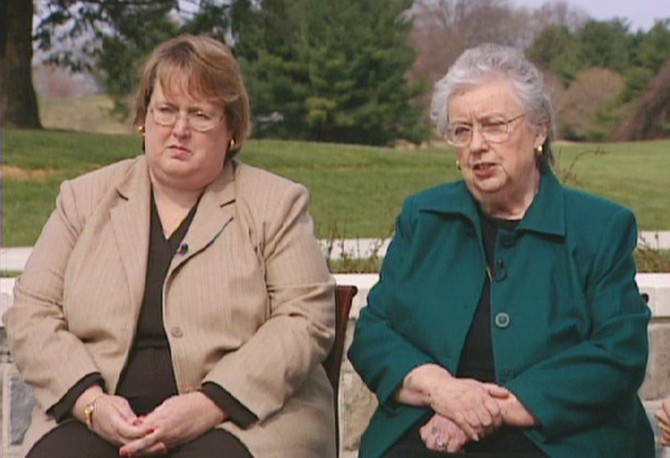
Millie says Kevin's wife and three children are still in a state of shock. "The real tragedy here is, I mean, our hearts are broken, but his children are going to be without their father for the rest of their lives. And they're young children," Millie says. "He loved his kids with a passion, and I know it sounds silly, but his oldest is only in the eighth grade, but he was already talking to them about where they would go to college and what they would do, and now what do we do?"
Kevin's body has not yet been released to the family, and Millie says the experience still feels unreal. "I'm not going to believe it until I see him, and I don't know when I'll see him," she says.
Kevin's sister Eileen says the situation is surreal. "You can't see Kevin, there's no word in terms of when we get to see Kevin. We can't really make arrangements, so it's like a waiting game when you know you've lost somebody but you can't sort of move forward."
Kevin's body has not yet been released to the family, and Millie says the experience still feels unreal. "I'm not going to believe it until I see him, and I don't know when I'll see him," she says.
Kevin's sister Eileen says the situation is surreal. "You can't see Kevin, there's no word in terms of when we get to see Kevin. We can't really make arrangements, so it's like a waiting game when you know you've lost somebody but you can't sort of move forward."
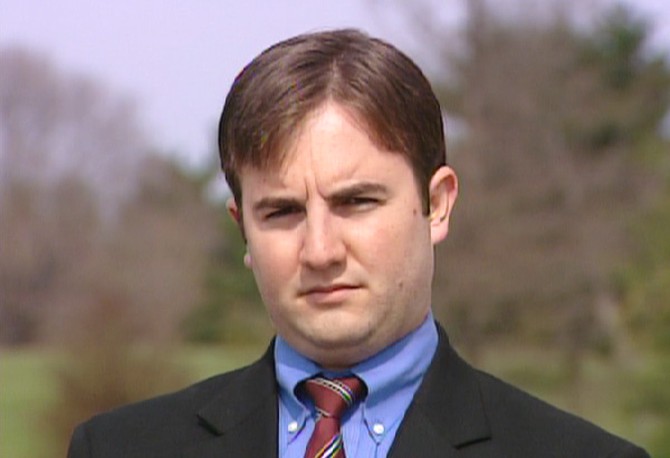
After the shootings, Virginia Tech senior Patrick Strollo says he couldn't get a hold of his sister Hilary, a biology major at the school. "I knew something bad had happened because I found out about the news and I had been text messaging my sister and she did not respond," he says. Just as Patrick began to get scared, he received a phone call.
"On Sunday night, one of my good friends suffered a minor heart attack and was actually in the hospital Monday morning when the inflow of injured students started coming in," he says. "My sister was in the stall next to him, and he heard her spell out her name and give my father's cell phone number to the physician. And immediately when he heard that, he tore off all his heart monitors and got a cell phone and gave me a call to let me know."
Hilary had been shot three times as she sat in her French class—but she survived. Patrick says he spent the day of the shootings at his sister's side in the Intensive Care Unit until their parents arrived.
"On Sunday night, one of my good friends suffered a minor heart attack and was actually in the hospital Monday morning when the inflow of injured students started coming in," he says. "My sister was in the stall next to him, and he heard her spell out her name and give my father's cell phone number to the physician. And immediately when he heard that, he tore off all his heart monitors and got a cell phone and gave me a call to let me know."
Hilary had been shot three times as she sat in her French class—but she survived. Patrick says he spent the day of the shootings at his sister's side in the Intensive Care Unit until their parents arrived.
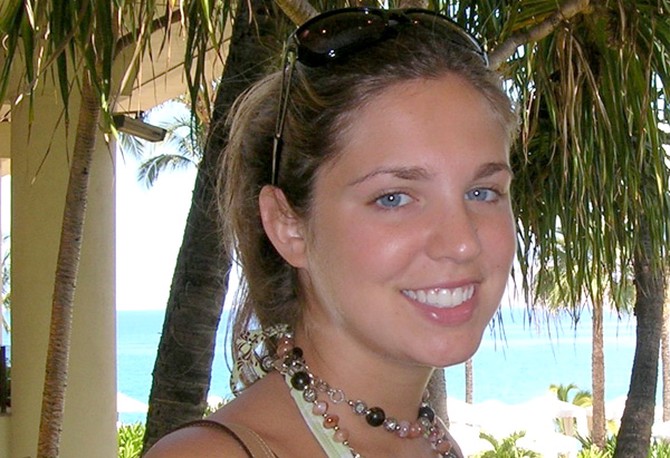
Patrick says Hilary is in stable condition, and he anticipates she will be taken from the ICU to a regular room soon. "At this point, we're just so grateful for my sister and everyone's prayers that they've sent out for her," he says. "She wouldn't have been able to survive without them. And we also send out our deepest condolences to all those that are injured and dead."
As her body continues to mend, Patrick says his sister talks about the shootings "a little bit," but his family's main concern is getting Hilary well again. "We're trying to keep happy thoughts right now and we're trying to get her just to focus on herself and get back to health before we really start to reflect on the incident," he says.
As her body continues to mend, Patrick says his sister talks about the shootings "a little bit," but his family's main concern is getting Hilary well again. "We're trying to keep happy thoughts right now and we're trying to get her just to focus on herself and get back to health before we really start to reflect on the incident," he says.
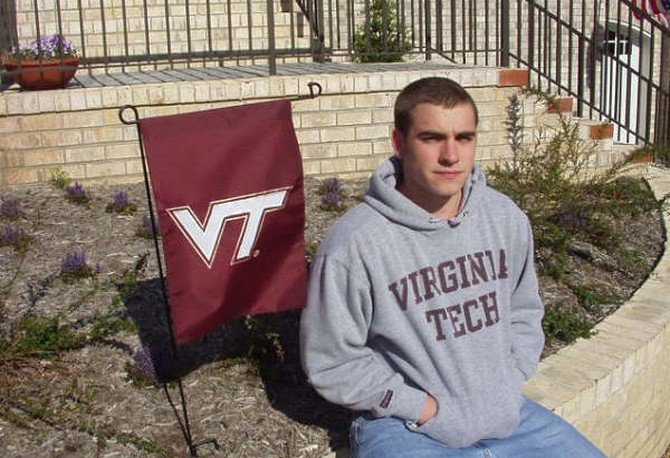
Virginia Tech senior Zach Petkewicz has been called a hero for saving lives with his quick thinking during the shooter's rampage. When the first shots rang out as Zach sat in class that morning, he says he initially thought they might be from construction or a science experiment. "But then I heard a girl scream, and that's when it all set in that something was happening," he says.
Zach says two girls in his class looked into the hallway and said they saw a man with a gun, and then slammed the door shut. "That's when everybody in the class kind of got out of their seats, kind of scattered in a panic," he says. At first, Zach hid behind the teacher's podium, but as he realized how vulnerable he and the other students really were, he sprang into action.
With the help of two classmates, Zach barricaded the door with a table to keep the shooter out. The gunman tried to force his way in and even succeeded in opening the door a few inches. When Zach and his classmates forced the door shut again, he says the gunman shot at it twice and then reloaded—and Zach thought he wasn't going to stop. "At that point, it was either me or him," Zach says. "And by the grace of God, he didn't try to force his way in again, and just started walking down the hall, firing again."
"I've heard psychologists say that there are three kinds of people in these situations—that there are people who act immediately, and there are other people who go into shock and can't move, and then there are other people who run screaming and hysterical," Oprah says. "And thank God you were the one who knew how to act."
Zach says two girls in his class looked into the hallway and said they saw a man with a gun, and then slammed the door shut. "That's when everybody in the class kind of got out of their seats, kind of scattered in a panic," he says. At first, Zach hid behind the teacher's podium, but as he realized how vulnerable he and the other students really were, he sprang into action.
With the help of two classmates, Zach barricaded the door with a table to keep the shooter out. The gunman tried to force his way in and even succeeded in opening the door a few inches. When Zach and his classmates forced the door shut again, he says the gunman shot at it twice and then reloaded—and Zach thought he wasn't going to stop. "At that point, it was either me or him," Zach says. "And by the grace of God, he didn't try to force his way in again, and just started walking down the hall, firing again."
"I've heard psychologists say that there are three kinds of people in these situations—that there are people who act immediately, and there are other people who go into shock and can't move, and then there are other people who run screaming and hysterical," Oprah says. "And thank God you were the one who knew how to act."
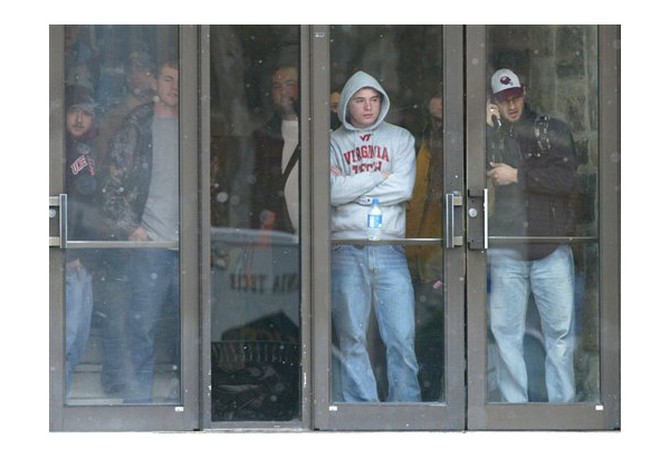
Photo: Matt Gentry/The Roanoke Times/AP Photo
Lucinda Roy, former chairwoman of the English department at Virginia Tech, says Cho Seung-Hui's writing and behavior had raised concerns before. In Fall 2005, Linda says one of Cho's teachers had contacted her, saying Cho's writings were angry and that he had been taking pictures on his cell phone during class.
When Lucinda wrote to Cho, telling him his behavior had been inappropriate, she says his reply was "rambling and strange and angry." "He seemed very arrogant in his response to me, defending himself against the allegation that he had behaved inappropriately in class," she says.
Lucinda says the writings contained "angry rants" against people and his situation. "When I asked him about this, he said that it was satirical. It was a satire. But I didn't buy that, so I really felt we needed to look into this further."
When Lucinda wrote to Cho, telling him his behavior had been inappropriate, she says his reply was "rambling and strange and angry." "He seemed very arrogant in his response to me, defending himself against the allegation that he had behaved inappropriately in class," she says.
Lucinda says the writings contained "angry rants" against people and his situation. "When I asked him about this, he said that it was satirical. It was a satire. But I didn't buy that, so I really felt we needed to look into this further."
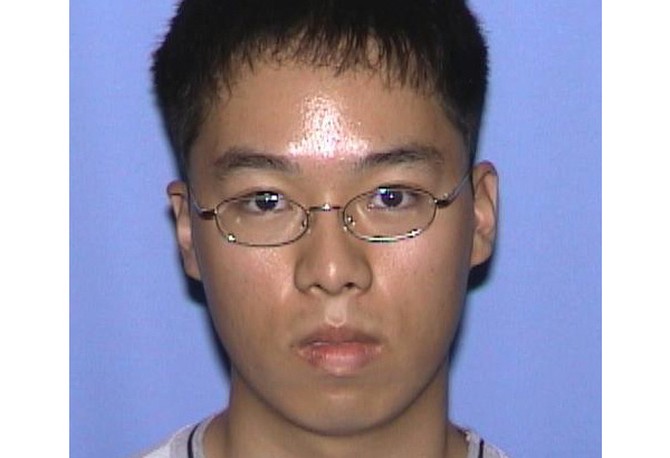
Photo: Virginia State Police/Associated Press
Lucinda sent Cho's response along with some of his writing to the Virginia Tech police and the school's counseling service. But the police told Lucinda that there was nothing they could do because Cho's work did not contain an "overt threat."
"Right now as the law stands, unless somebody actually threatens to do something, then it's incredibly difficult to move on them," she says. "The police and counseling and the college and student affairs, all of them really wanted to help me as much as they could and they responded quickly, but they felt that their hands were tied because of the legality of the situation."
Because the students and teacher were uncomfortable, and Lucinda wanted them to feel safe, Cho stopped attending the class and Lucinda tutored him. During those sessions, Lucinda says she had a signal she could use to let her assistant know to call security if she began to feel unsafe. "That sounds very unusual, but in fact, I would think that most people in administrative positions or who work very closely with students do have some kind of safety mechanism so that they can call for help," she says.
In fact, Lucinda has heard from many teachers who face this issue. "I've been getting e-mails and phone calls from people all over the country, from middle school up, saying, 'I'm going through the same kind of thing. What can I do?' or 'I'm afraid to give an F to a student because I don't know what the reactions are going to be,'" she says. "This is endemic. This is a really serious problem."
"Right now as the law stands, unless somebody actually threatens to do something, then it's incredibly difficult to move on them," she says. "The police and counseling and the college and student affairs, all of them really wanted to help me as much as they could and they responded quickly, but they felt that their hands were tied because of the legality of the situation."
Because the students and teacher were uncomfortable, and Lucinda wanted them to feel safe, Cho stopped attending the class and Lucinda tutored him. During those sessions, Lucinda says she had a signal she could use to let her assistant know to call security if she began to feel unsafe. "That sounds very unusual, but in fact, I would think that most people in administrative positions or who work very closely with students do have some kind of safety mechanism so that they can call for help," she says.
In fact, Lucinda has heard from many teachers who face this issue. "I've been getting e-mails and phone calls from people all over the country, from middle school up, saying, 'I'm going through the same kind of thing. What can I do?' or 'I'm afraid to give an F to a student because I don't know what the reactions are going to be,'" she says. "This is endemic. This is a really serious problem."
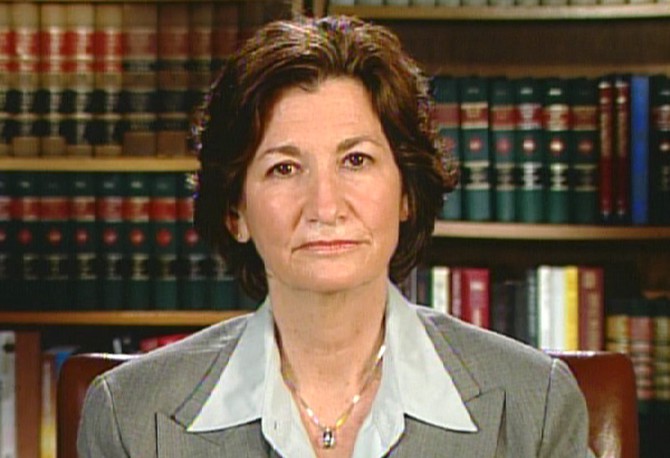
Dr. Susan Lipkins, a psychologist and expert on hazing, analyzed some of Cho's writings. "I found that he had really lost his connection with reality," she says. "The amount of violence and the rambling are similar to people who are schizophrenic, who have some other kind of psychotic disorder, and that it was very, very clear that this man needed psychological intervention immediately."
Learn more about the mental health issues every school needs to address.
Based on Cho's writings, Dr. Lipkins says she is not surprised he became a shooter. "Violence is rarely random. It's planned, as it was in this case. It's the victims who are random," she says. "We have to teach people how to stand up and protect themselves."
Learn more about the mental health issues every school needs to address.
Based on Cho's writings, Dr. Lipkins says she is not surprised he became a shooter. "Violence is rarely random. It's planned, as it was in this case. It's the victims who are random," she says. "We have to teach people how to stand up and protect themselves."
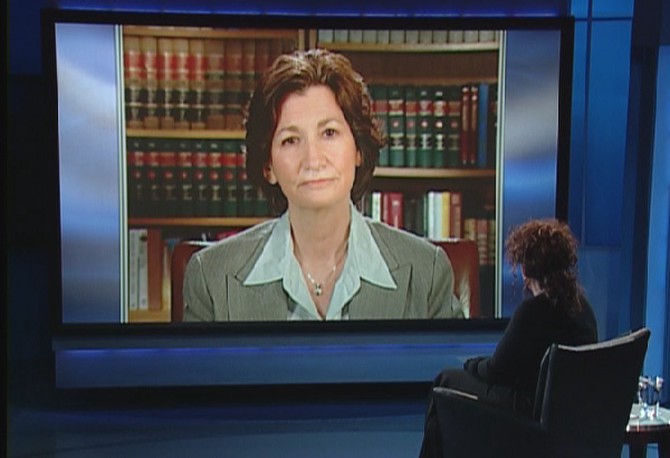
Dr. Lipkins says there are always warning signs—and there certainly were in Cho's case. "His writings were rambling. They were violent. We had heard that he was stalking women, that he had supposedly set fire in a dorm, that there were issues on blogs and online that were very, very clear that this was a disturbed man, that he really had a loose connection to reality," she says.
And while some students or faculty might have noticed these warning signs, Dr. Lipkins says there should be a way to act on them. "We need to have a system of triage to fast-track these kinds of concerns so that the administrations take these things seriously," she says.
Dr. Lipkins says it is important for the media to continue focusing on the issue, while universities should examine their budgets for psychological counseling and security services. "We should have training so that when there is an emergency on any campus throughout America, there's a system in place, and more importantly, that all the psychological problems of kids can be taken care of appropriately," she says.
And while some students or faculty might have noticed these warning signs, Dr. Lipkins says there should be a way to act on them. "We need to have a system of triage to fast-track these kinds of concerns so that the administrations take these things seriously," she says.
Dr. Lipkins says it is important for the media to continue focusing on the issue, while universities should examine their budgets for psychological counseling and security services. "We should have training so that when there is an emergency on any campus throughout America, there's a system in place, and more importantly, that all the psychological problems of kids can be taken care of appropriately," she says.
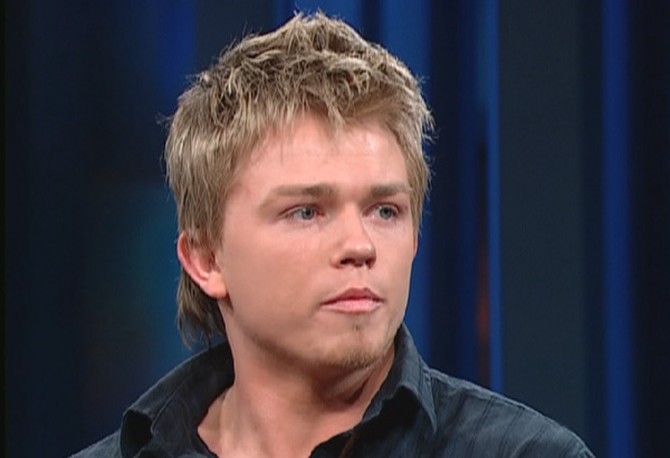
On April 20, 1999, Craig Scott was in the library of Columbine High School when Eric Harris and Dylan Klebold gunned down his fellow students right before his eyes. His sister, Rachel, was one of the first to die in that shooting.
Today, Craig travels across the country and speaks to thousands of teens every month about the importance of fostering "an atmosphere of kindness and compassion" in classrooms to stop school violence.
Craig urges Virginia Tech and the media covering the story to avoid focusing on the negative. "It's really easy to look back and see that ... the warning signs, and you can study all the things that the shooter left behind and you can try to say, 'Why didn't we see this coming?'" Craig says. "The big concern that I have is the attention and focus that's put on the shooter. [Reports say], 'It's the most bloody, the biggest, the record...' and records can be broken. And I have found students that actually idolize the two shooters at Columbine."
Instead, Craig urges everyone to focus on the positive. "Where you choose to focus immediately is very important. What you're going to choose to spend your time thinking about," he says. "We've focused on my sister, Rachel, who's so compassionate and kind. And from that, that's the opposite of that anger and hatred."
Today, Craig travels across the country and speaks to thousands of teens every month about the importance of fostering "an atmosphere of kindness and compassion" in classrooms to stop school violence.
Craig urges Virginia Tech and the media covering the story to avoid focusing on the negative. "It's really easy to look back and see that ... the warning signs, and you can study all the things that the shooter left behind and you can try to say, 'Why didn't we see this coming?'" Craig says. "The big concern that I have is the attention and focus that's put on the shooter. [Reports say], 'It's the most bloody, the biggest, the record...' and records can be broken. And I have found students that actually idolize the two shooters at Columbine."
Instead, Craig urges everyone to focus on the positive. "Where you choose to focus immediately is very important. What you're going to choose to spend your time thinking about," he says. "We've focused on my sister, Rachel, who's so compassionate and kind. And from that, that's the opposite of that anger and hatred."
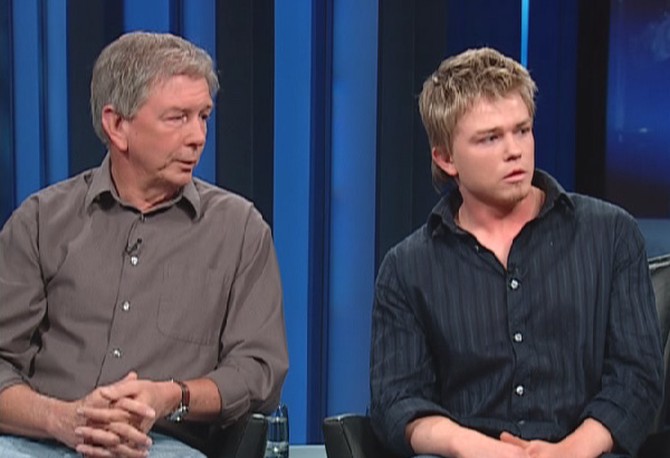
Darrell Scott, Craig and Rachel's father, says everyone has the power to make the choice of where to focus their attention in times of crisis. For example, he says, "Craig made a choice to make a difference."
Together, Darrell and Craig run Rachel's Challenge, a group dedicated to stopping school violence. "We lead challenges from dealing with prejudice to reaching out to that lone kid in the cafeteria and reporting when there is something out of the ordinary," Darrell says. "And we've seen incredible lives touched and changed."
When there are kids who are alone and angry, Craig says it's important to combat the negativity with love. "It's going to take ... a heart connection to bring him back to human touch. And that's what we try to do and try to bring a real story in," Craig says. "And I hope that with the families in Virginia Tech that they ... have 33 wonderful stories of beautiful people and beautiful memories and stories to hold onto."
Should NBC News have aired a video from the gunman? NBC's Brian Williams sits down with Oprah.
Together, Darrell and Craig run Rachel's Challenge, a group dedicated to stopping school violence. "We lead challenges from dealing with prejudice to reaching out to that lone kid in the cafeteria and reporting when there is something out of the ordinary," Darrell says. "And we've seen incredible lives touched and changed."
When there are kids who are alone and angry, Craig says it's important to combat the negativity with love. "It's going to take ... a heart connection to bring him back to human touch. And that's what we try to do and try to bring a real story in," Craig says. "And I hope that with the families in Virginia Tech that they ... have 33 wonderful stories of beautiful people and beautiful memories and stories to hold onto."
Should NBC News have aired a video from the gunman? NBC's Brian Williams sits down with Oprah.
Published 01/01/2006

